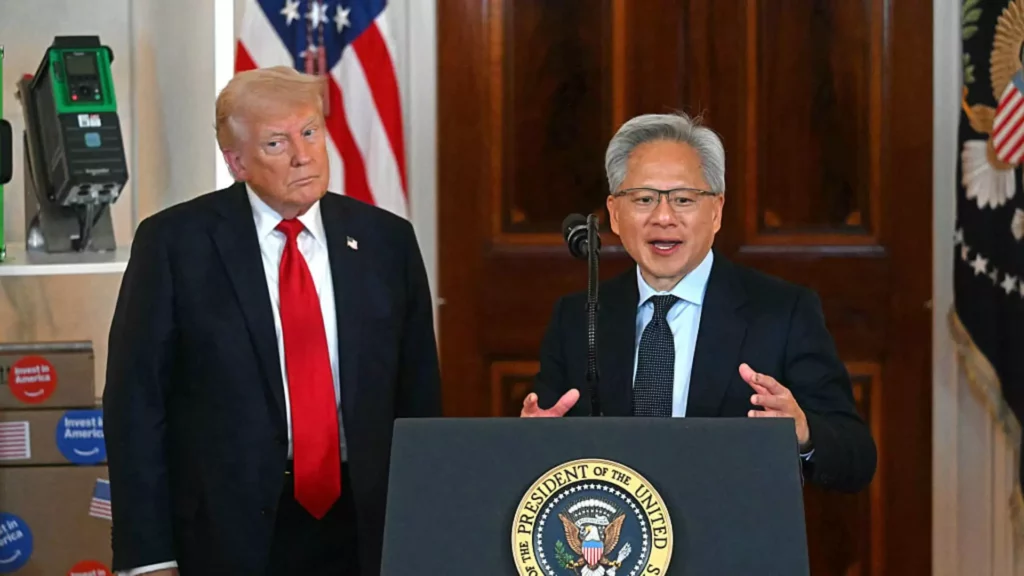In recent political debates, a troubling narrative has emerged that frames economic negotiations with China—specifically, the sale of American AI chips—as vital steps toward maintaining global competitiveness. However, a closer examination reveals that this perspective is perilously shortsighted. Allowing Nvidia and AMD to sell advanced semiconductor technology to China while taking a 15% cut in revenue may seem like a pragmatic approach to fostering economic growth, but it fundamentally underestimates the grave national security costs involved. Such policies are built on an illusion that complex technological advantage can be commodified or negotiated away without consequences. In reality, this approach signals a dangerous surrender of strategic dominance that has been painstakingly preserved over decades for safeguarding US interests.
The misconception here is assuming that the revenue trade-off is a mere economic calculation, neglecting the invaluable strategic edge that powerful AI and semiconductor technologies confer. These chips are not just components; they are the fundamental enablers of military superiority, advanced intelligence operations, and technological innovation. When the government consents to share, or even profit from, such sensitive technologies being sold to an authoritarian regime, it signals a shift from safeguarding national security to merely chasing short-term fiscal gains. To accept a 15% cut in revenue from AI chip sales to China, especially with no rigorous restrictions on technology usage, is to gamble on the idea that economic prosperity can be divorced from security—an assumption that history has repeatedly proven dangerous.
The Flawed Logic of Compromising on Cutting-Edge Military Technologies
The senators’ concerns about China’s military strengthening are justified, yet they are often dismissed or downplayed by administration officials. Nvidia’s denial that their chips could enhance military capabilities is a classic deflection, but it does little to address the broader issue. Any cutting-edge AI hardware—regardless of whether the chip is overtly military—has inevitably civilian and military crossover potential. AI-driven systems, autonomous weapons, surveillance, and reconnaissance tools all benefit from advanced processing power. By permitting the sale of these chips, the U.S. inadvertently bolsters China’s strategic posture, transforming commercial technology into a dual-use asset that narrows the technological gap the U.S. has long maintained.
What makes this scenario particularly troubling is the naive belief that revenue-sharing schemes can control or limit the use of sensitive technologies. History teaches us that technology is rarely confined within predefined boundaries once exported; it finds its way into the hands of regimes eager to leverage any advantage they can get. The notion that forbidding the H20 chip would cost American taxpayers billions in lost opportunity ignores the far greater price that could be paid in national security deterioration. In the grand chessboard of global power, transactional revenue should never override foundational security interests.
The Political Drama: Cynicism in the Face of Strategic Retreat
The public political discourse surrounding this deal is tinged with cynicism and finger-pointing. The Biden administration’s predecessors, particularly during Joe Biden’s tenure, supposedly abandoned a robust stance on export controls, allowing these chips—and similar technologies—to flow freely to China. Yet, the current administration’s reluctance to confront these issues head-on seems to stem from a misguided belief in economic diplomacy rather than national resilience.
What is striking here is the political posturing. On one side, Democrats warn about the security implications, but on the other, policies are compromised in the name of maintaining technological and economic ties. This hypocrisy betrays a fundamental flaw in our national strategy: the tendency to rationalize short-term economic gains while neglecting long-term security consequences. The White House dismisses critics as irrelevant, but their complacency exposes a reckless blindness that could cost far more than lost revenue: the erosion of U.S. technological hegemony. In the end, this pattern suggests a leadership unwilling to prioritize strategic interests over economic convenience—an almost naive misjudgment about the nature of technological warfare and international power dynamics.
Discussions about AI chips and international trade are often framed as necessary compromises or technological pragmatism. But, from a center-right liberal perspective, the essence of the issue lies in safeguarding American leadership and preventing strategic encroachments that could undermine national sovereignty. The lessons of history warn us that technology is the ultimate frontier of power, and allowing its unrestricted flow to adversaries is a gamble with the country’s future. Instead of tolerating this creeping erosion, the U.S. must recalibrate its approach—valuing security and innovation equally, and refusing to accept revenue cuts that come at the expense of security. Only then can we truly secure a future where American technological dominance remains unchallenged.









Leave a Reply